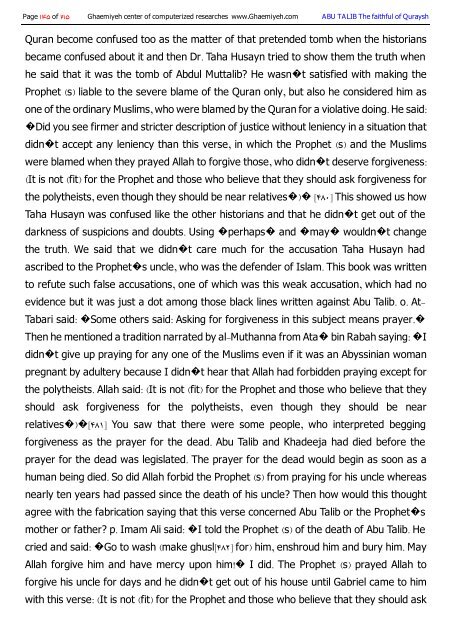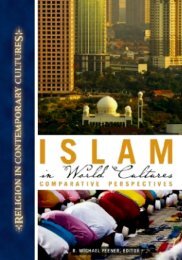Download Here - Islamic Books, Islamic Movies, Islamic Audio, All ...
Download Here - Islamic Books, Islamic Movies, Islamic Audio, All ...
Download Here - Islamic Books, Islamic Movies, Islamic Audio, All ...
Create successful ePaper yourself
Turn your PDF publications into a flip-book with our unique Google optimized e-Paper software.
Page 145 of 215<br />
Ghaemiyeh center of computerized researches www.Ghaemiyeh.com<br />
ABU TALIB The faithful of Quraysh<br />
Quran become confused too as the matter of that pretended tomb when the historians<br />
became confused about it and then Dr. Taha Husayn tried to show them the truth when<br />
he said that it was the tomb of Abdul Muttalib? He wasnt satisfied with making the<br />
Prophet (s) liable to the severe blame of the Quran only, but also he considered him as<br />
one of the ordinary Muslims, who were blamed by the Quran for a violative doing. He said:<br />
Did you see firmer and stricter description of justice without leniency in a situation that<br />
didnt accept any leniency than this verse, in which the Prophet (s) and the Muslims<br />
were blamed when they prayed <strong>All</strong>ah to forgive those, who didnt deserve forgiveness:<br />
(It is not (fit) for the Prophet and those who believe that they should ask forgiveness for<br />
the polytheists, even though they should be near relatives) [480] This showed us how<br />
Taha Husayn was confused like the other historians and that he didnt get out of the<br />
darkness of suspicions and doubts. Using perhaps and may wouldnt change<br />
the truth. We said that we didnt care much for the accusation Taha Husayn had<br />
ascribed to the Prophets uncle, who was the defender of Islam. This book was written<br />
to refute such false accusations, one of which was this weak accusation, which had no<br />
evidence but it was just a dot among those black lines written against Abu Talib. o. At-<br />
Tabari said: Some others said: Asking for forgiveness in this subject means prayer.<br />
Then he mentioned a tradition narrated by al-Muthanna from Ata bin Rabah saying: I<br />
didnt give up praying for any one of the Muslims even if it was an Abyssinian woman<br />
pregnant by adultery because I didnt hear that <strong>All</strong>ah had forbidden praying except for<br />
the polytheists. <strong>All</strong>ah said: (It is not (fit) for the Prophet and those who believe that they<br />
should ask forgiveness for the polytheists, even though they should be near<br />
relatives)[481] You saw that there were some people, who interpreted begging<br />
forgiveness as the prayer for the dead. Abu Talib and Khadeeja had died before the<br />
prayer for the dead was legislated. The prayer for the dead would begin as soon as a<br />
human being died. So did <strong>All</strong>ah forbid the Prophet (s) from praying for his uncle whereas<br />
nearly ten years had passed since the death of his uncle? Then how would this thought<br />
agree with the fabrication saying that this verse concerned Abu Talib or the Prophets<br />
mother or father? p. Imam Ali said: I told the Prophet (s) of the death of Abu Talib. He<br />
cried and said: Go to wash (make ghusl[482] for) him, enshroud him and bury him. May<br />
<strong>All</strong>ah forgive him and have mercy upon him! I did. The Prophet (s) prayed <strong>All</strong>ah to<br />
forgive his uncle for days and he didnt get out of his house until Gabriel came to him<br />
with this verse: (It is not (fit) for the Prophet and those who believe that they should ask














